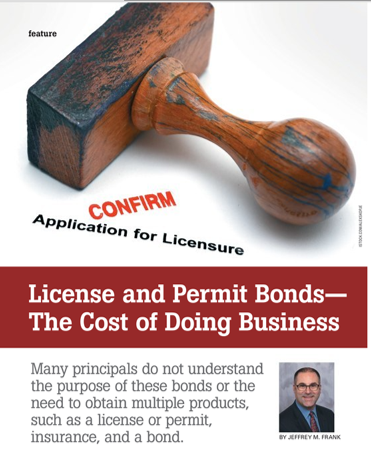Published in Surety & Bond Quarterly, Fall 2021.

One can think of license and permit bonds as the cost of doing business. Unlike payment and performance bonds, or even probate bonds, which relate to a specific construction project or an estate, obtaining a license or permit bond is generally a condition for certain businesses or individuals to operate. Essentially, obtaining one of these bonds is a condition precedent to being able to work.
The requirements for license and permit bonds can be found in state or federal statutes or local/municipal ordinances. This means that the requirements can even differ from city to city within the same state. It is, therefore, extremely important for a producer to understand what type of bond the account needs and the type of entity requiring that bond.
In some cases, a state may make a licensing rule that requires a bond. Beyond that, municipalities may have their own rules. This means, for example, that, whenever a contractor undertakes work in a municipality, either the contractor or his or her attorney should determine if a license or permit bond is necessary for that municipality. This is a great opportunity for additional business if a contractor does work in a broad geographic area. Click here to read article.
About the Author
Jeffrey M. Frank is a shareholder of Lipson Neilson PC, practicing in the Bloomfield Hills, Michigan office. Frank is licensed to practice in Michigan and is admitted to the U.S. District Court, Eastern and Western Districts of Michigan, and the Sixth Circuit Court of Appeals.
He concentrates his practice primarily in the areas of fidelity and surety law, specializing in commercial surety, as well as commercial and probate litigation. He is an inaugural member of the NASBP Attorney Advisory Committee.
He can be reached at jfrank@lipsonneilson.com or 248-593-5000.
